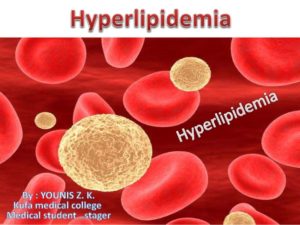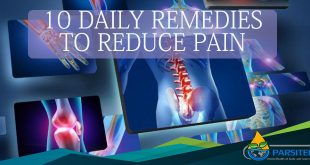Hyperlipidemia is an elevation of one or more fat proteins in the blood. It is commonly referred to as high cholesterol. One-third of American adults have it, only 1 in 3 have it under control, and having hyperlipidemia doubles the risk of developing heart disease. Genetic predisposition, cigarette smoking, obesity, poor diet, and a sedentary lifestyle can all lead to hyperlipidemia. Although hyperlipidemia has no symptoms, it can be detected by a simple blood test.
Fast facts about hyperlipidemia
Here are some key points about hyperlipidemia. More detail and supporting information is in the main article.
-
 Hyperlipidemia is a major risk factor for heart disease, the leading cause of death in the US.
Hyperlipidemia is a major risk factor for heart disease, the leading cause of death in the US. - Hyperlipidemia is also called high cholesterol, hypercholesterolemia, or hypertriglyceridemia.
- LDL is bad.
- HDL is good.
- Women are more likely than men to have high cholesterol.
- The liver produces 75% of our cholesterol.
- Plant-based foods contain no cholesterol.
- There are no symptoms of hyperlipidemia.
- Hypothyroidism (underactive thyroid) can cause high cholesterol.
- Diets high in saturated fats contribute to hyperlipidemia.
- Being overweight can increase cholesterol.
- Regular physical activity can raise the good cholesterol (HDL) and lower the bad (LDL).
- 1 in 500 people worldwide has familial hyperlipidemia.
What is hyperlipidemia?
Hyperlipidemia is too much cholesterol in the blood. Cholesterol is a waxy, fat protein manufactured by the liver and is essential for healthy cell membranes, hormone production, and vitamin storage.
Even the brain depends on cholesterol for proper functioning. Cholesterol becomes a problem when too much of the bad kind is produced or ingested through regular eating of unhealthy foods.
Cholesterol is carried through the blood to cells by lipoproteins that are either low density (LDL) or high density (HDL). Think of the lipoprotein as the vehicle and cholesterol as the passenger.
Triglycerides, a type of fat in the blood, are different from cholesterol, but because of their strong association with heart disease, triglycerides are measured as well.
Often it is both the LDL and triglycerides that are elevated in hyperlipidemia.
What causes hyperlipidemia?
The causes of hyperlipidemia are either genetic (familial or primary hyperlipidemia) or from a poor diet and other specific factors (secondary hyperlipidemia).
When the body cannot utilize or remove the excess fat, it accumulates in the blood. Over time, the buildup damages the arteries and internal organs. This process contributes to the development of heart disease.
In familial hyperlipidemia, the high cholesterol has nothing to do with poor habits but is caused by a genetic disorder.
A mutated gene passed down from either the mother or father causes a missing or malfunctioning LDL receptor. The LDL accumulates to dangerous amounts in the blood.
Certain ethnic groups such as French Canadians, Christian Lebanese, South African Afrikaners, and Ashkenazi Jews are at a higher risk of hereditary hyperlipidemia.
Other causes of hyperlipidemia may include excessive drinking of alcohol, obesity, side effects of medications such as hormones or steroids, diabetes, kidney disease, underactive thyroid gland, and pregnancy.
Signs and symptoms of hyperlipidemia
With familial hyperlipidemia, a person could show signs of high cholesterol with yellowish fatty growths (xanthomas) around the eyes or the joints. Otherwise, hyperlipidemia has no signs or symptoms, and unless picked up with the fasting lipid profile, the high cholesterol would remain undetected.
An individual could have a heart attack or stroke, and later learn it was precipitated by hyperlipidemia.
Excessive fat in the blood accumulates over time, forming plaques on the walls of the arteries and blood vessels. This will narrow the openings, producing turbulent blood flow through the vessels, and cause the heart to use more force to get the blood through the constricted areas.
Tests and diagnosis of hyperlipidemia
Screening for hyperlipidemia is done with a blood test called a lipid profile. It is important that a person has nothing to eat or drink for 9-12 hours prior to having the sample drawn.
Screening should start at age 20, and if normal, it should be repeated at least every five years. Normal levels for a lipid profile are listed below:
- Total cholesterol: less than 200
- LDL: less than 100
- HDL: greater than 40 for men, greater than 50 for women (higher is even better)
- Triglycerides: less than 140.
Treatment and prevention of hyperlipidemia
Lifestyle modification remains the best strategy for both preventing and treating hyperlipidemia. This involves adhering to a “heart healthy” diet, regular exercise habits, no smoking, and maintenance of a healthy weight. Additionally, medications known as statins are indicated for some individuals.
Diet suggestions
It is not necessary to follow a low-fat diet but rather reduce the intake of saturated fat, trans fats, and cholesterol. The diet should consist of a colorful array of whole fruits and vegetables, be high in fiber, and whole grains. Fast foods, high carbohydrate foods, and any foods that do not offer good nutritional value should be restricted or eliminated. Regular servings of fish, nuts, and legumes are recommended. When oil is used, it should be olive or another monounsaturated oil.
Weight
Being overweight is a risk factor for hyperlipidemia and heart disease. Losing weight can help lower your LDL, total cholesterol, and lower your triglyceride levels. It can also raise your HDL, which helps to remove the bad cholesterol out of the blood.
Physical activity
Not being physically active is a risk factor for heart disease. Regular exercise and activity can help lower LDL (bad) cholesterol and raise HDL (good) cholesterol levels. It also helps you lose weight. You should try to be physically active for 30 minutes at least 5 days a week. Brisk walking is an excellent and easy choice for exercise.
No smoking
Smoking activates many problems that contribute to heart disease. It promotes plaque buildup on the walls of the arteries, increases the bad cholesterol, encourages blood clot formations and inflammation.
Quitting smoking will result in increases in HDL, which may be part of the reduced cardiovascular disease risk seen after smoking cessation.
Medications
Your medical provider will use established guidelines to evaluate your lipid profile along with your risk factors to determine if and when these medications may be necessary.The most commonly prescribed high cholesterol medicines are statins (simvastatin, lovastatin, atorvastatin, and rosuvastatin). Occasionally statins are not tolerated due to side effects of muscle pain. Hyperlipidemia is a common health problem that can lead to serious cardiovascular (heart) disease. There are no signs or symptoms of high cholesterol making it vital that individuals be aware of the need to be screened. Hyperlipidemia and subsequent heart disease can be prevented and treated through the appropriate use of medication and maintenance of a heart healthy lifestyle. An advisory committee for the Food and Drug Administration has recommended the approval of a novel, injectable cholesterol-lowering drug called alirocumab, though many committee members have noted certain restrictions for its use and have requested further data on the drug’s ability to reduce the risk of heart problems.
Treatment in herbal medicine

We offer “Paprika cardi I” or “Paprika artery cleanser”to control and treat hyperlipidemia. It is made of extract of more than 30 plants which are playing an important role in reduction of hyperlipidemia. Generally, this combination works as an artery cleanser.
References:
www.medicalnewstoday.com
 Parsi Teb Physical and Mental Health Journal
Parsi Teb Physical and Mental Health Journal 
 Hyperlipidemia is a major risk factor for heart disease, the leading cause of death in the US.
Hyperlipidemia is a major risk factor for heart disease, the leading cause of death in the US.


